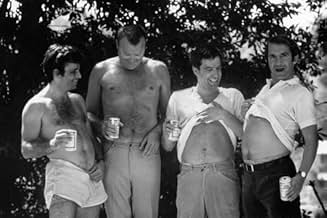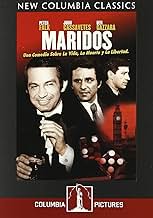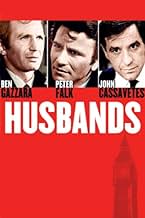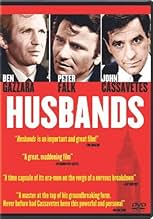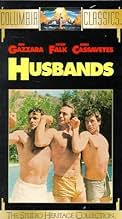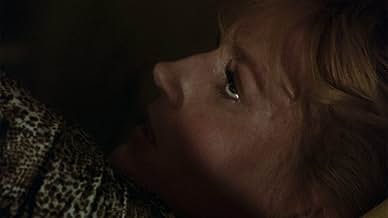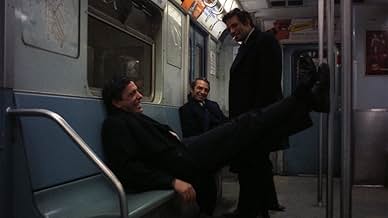Husbands
- 1970
- Tous publics
- 2h 34min
Après la mort d'un ami commun, trois hommes mariés abandonnent simultanément leur vie pour trouver le plaisir et la liberté, puis partent pour Londres.Après la mort d'un ami commun, trois hommes mariés abandonnent simultanément leur vie pour trouver le plaisir et la liberté, puis partent pour Londres.Après la mort d'un ami commun, trois hommes mariés abandonnent simultanément leur vie pour trouver le plaisir et la liberté, puis partent pour Londres.
- Réalisation
- Scénario
- Casting principal
- Récompenses
- 1 nomination au total
- Annie
- (as Meta Shaw)
- 'Normandy' Singer
- (as Eleanor Gould)
Avis à la une
After the death of their friend, three middle-aged men - Harry (Ben Gazzara), Gus (Cassavetes) and Archie (Peter Falk) - find it difficult to cope. We follow them over the course of two days, where they drink heavily, play basketball together, and have a boisterous singing contest with friends and family. After returning home from his binge, Harry is thrown out by his wife, and shortly after announces he is flying to London. Seemingly with nothing better to do, Gus and Archie decide to join him, where they indulge is more drinking, gambling, and womanising. Gus finds himself with a much younger woman named Mary (Jenny Runacre), who is wild and unpredictable.
In the same vein as Faces (1968), Cassavetes adopts a cinema verite style, while taking the story and characters to almost hyper-reality. This is not quite the world we live in, only it feels like it. It's a more extreme world, where everything is just a little bit more depressing and the inhabitants are always loathsome in one way or another. It's as if Cassavetes wants us to take a real look at ourselves, whoever we are, and be repulsed. Harry, Gus and Archie are despicable, taking no second thoughts when committing adultery, and ultimately being loud, angry and disgusting when in the presence of others. They are also empty, devoid of any real emotion, only finding any real solitude in each other's company.
Judging from the title, Cassavetes uses the film to summarise a broad idea as to why men must go through this at some point in their life. The trio are little more than wild children, only with sexual experience, and the camera, as usual, is close, capturing the slightest facial movement, almost to the point of infringement. It's a depressing, brutal experience, where scenes go on for much longer than they should, making us want to get away from these characters. But maybe that's the point, and Cassavetes takes it to the extreme to push his point across. The final scene is certainly worth the wait however, managing to depict a character in one simple close-up as both tragic and pathetic.
www.the-wrath-of-blog.blogspot.com
What I do like about Cassavetes is that he explored in a way few writers/directors at the time did the complexities of male emotions. His male characters don't fall into easy categories and neither do their interior lives. In what he has his characters say and do, it's like he wanted to present the male id on screen visually, in all its obnoxious glory.
But the flip side is that it makes his characters unpleasant and exhausting to be with. I went out with a bunch of guys for a bachelor party once, and one of them was talking loudly about how ugly and fat a girl was sitting at a nearby table in a bar. He clearly wanted her to hear, and it's like he was performing for the rest of us. The other guys, because they didn't want to be accused of ruining the evening I guess, or because they genuinely found it funny, played along and encouraged him. The whole experience was so uncomfortable and toxic that I left shortly after and didn't go on to do the rest of the things planned for the evening.
Watching "Husbands" is like two hours of that experience. It's watching three guys hang out and desperately try to avoid the emotions stirred up by the recent death of a fourth buddy. This means they fight, get maudlin, get drunk, get abusive, treat women like crap. We don't get to know these guys. We're just dumped into the middle of their circle of friendship and sent off with them into the night to hang out for a couple of hours. I can't relate to Cassavetes movies. I'm the same age as the guys in this movie, maybe even a little older than they're supposed to be, with a wife and kids. I don't understand the contempt and anger they show for the world, for their wives, for each other. They don't live in a world that resembles anything I've directly experienced. And since Cassavetes just observes rather than explains, I don't learn anything about it that might help me understand more. I just get claustrophobic and want to leave the party early. Like every other Cassavetes movie I've seen, this one felt more than anything else like an endurance test.
Grade: B
Some of John Cassavetes' films can be hard to watch. OPENING NIGHT is an interesting experiment, top-heavy with subplots. GLORIA was an aborted attempt at a more commercial film. Although Gena Rowlands would kick Sharon Stone's butt if both of their films were compared, the pace to Cassavetes' GLORIA is languid. Not what you'd expect from an action film.
This is, however, one of the Cassavetes' traits: the element of surprise.
There are alot of surprises in HUSBANDS. The film begins with a funeral, as Falk, Gazzara, and Cassavetes put their friend to rest. This event depresses these men, and they go on a drinking binge that seems to last the rest of the movie. There is drinking, carousing, horseplay, sex with female strangers, and a conspicuous tendancy to ignore the wives. These are married men, but until their conscious returns to them, they seem to forget that.
HUSBANDS is what I would term as a humble classic. The main reason why I consider myself a Cassavetes fan is because his films are humble. They are always ambitious, mind you, but I love the choices that Cassavetes makes in his editing, and his casting. Cassavetes allows the actors to explore the characters as they are acting on camera, and sometimes this leaves the rough edges of improvisation showing. He knows how to draw out un-self-conscious performances, and there is sometimes gold mined from this method.
Along with WOMAN UNDER THE INFLUENCE, this is my favorite of the films in Cassavetes catalogue. While HUSBANDS is Cassavetes "man" film, I suppose...INFLUENCE could be seen as his "woman" film. But, to be fair, Cassavetes made films about both sexes, and usually quite successfully. If you have heard of Cassavetes and are not familiar with his work, this is a good place to start.
HUSBANDS, in its climaxes and anti-climaxes, ends up feeling more and more like reality as you watch it. There are strange moments, and as I said before many surprises. But these are some of the kinds of moments that make up life: When a friend goes from laughter to tears in moments, when a joke is no longer funny, and becomes more serious than a heart attack. HUSBANDS is about common people, and how uncommon they can sometimes be. There is darkness, and there is light. Watch HUSBANDS to know what I'm talking about.
Le saviez-vous
- AnecdotesScreenwriter John Cassavetes wrote the film's dialogue after doing improvisations with actors Ben Gazzara and Peter Falk. Reportedly, Cassavetes built the film's three main central characterizations around the real-life personalities of the film's three main actors one of whom included himself.
- Citations
Archie Black: [Arriving at the funeral] I suppose this is proper, all these big cars and chauffeurs. Black shiny cars. Seems dopey for a guy like that. Well, I guess that's what they do. People get symbolic over death. They get very formal, and it's really ridiculous. Because it's probably the most humiliating thing in the world. But I feel very relaxed. People die of tensions. That's all they die of, Gus. That's the truth. Did you know that? I know it, and it's something I'm never gonna forget.
Gus Demetri: Don't believe truth. Just don't believe truth. Archie, I'm telling you, don't believe truth.
Archie Black: That is the truth now. You see, the truth will never kill you. Lies will. Not cigarettes, not alcohol. Lies, Gus. Lies and tensions. That'll kill you. That'll kill you before cancer in the heart. Did you know that?
- Crédits fousThere are no closing credits and no "THE END" title card. The screen just goes black. In the opening credits, everyone involved in the film (even the "little people") are credited on two "tell all" title cards, right on down from the actors to the grips, a total of 82 credits.
- Versions alternativesThe original theatrical release ran 154 minutes. The out-of-print VHS release from Columbia/Tristar runs 132 minutes.
- Bandes originalesShow Me the Way to Go Home
(1925) (uncredited)
Written by Irving King
Sung a cappella by Ben Gazzara, Peter Falk and John Cassavetes
Meilleurs choix
- How long is Husbands?Alimenté par Alexa
Détails
Box-office
- Budget
- 1 000 000 $US (estimé)
- Montant brut mondial
- 3 170 $US
Contribuer à cette page



